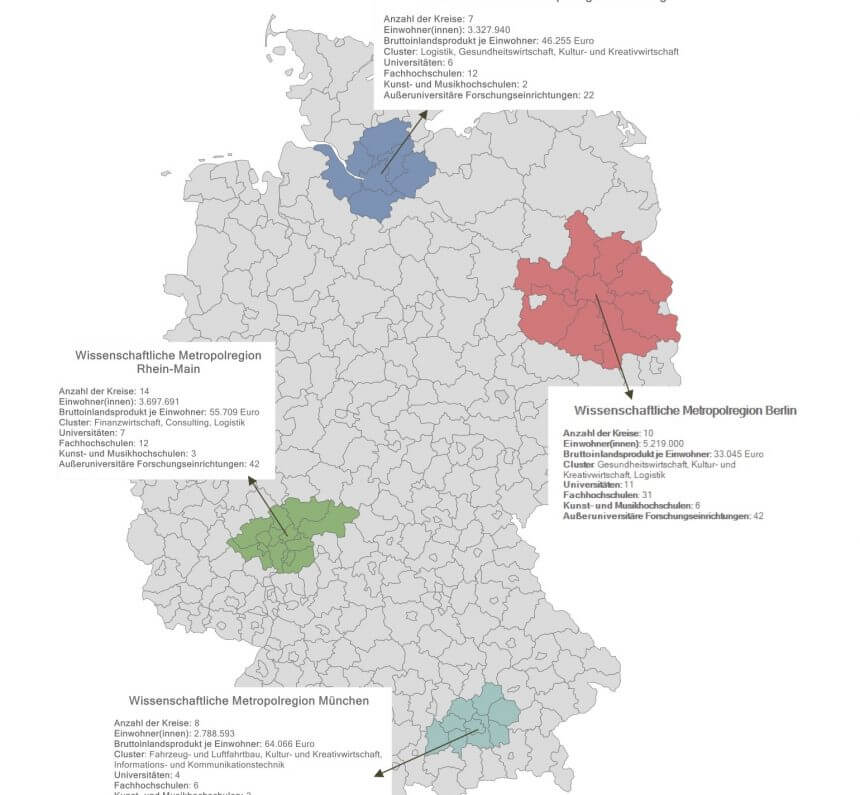No products in the cart.
Archiv

Market and potential analyses for eight study courses at the TH OWL
23 January 2020
CHE Consult has conducted market and potential analyses for eight courses of study at the OWL Technical University. The courses examined are the established Bachelor’s degree courses in Open Space Management and Precision Farming, as well as the planned Bachelor’s and Master’s degree courses in the fields of mechanical engineering,mechatronics, production and wood technology and energy and climate protection were examined.
The aim of the analyses was to provide insights for the decision on the introduction or further development of the study programmes and to create a basis for a marketing concept that takes into account both the demand and supply situation of the study programmes.
CHE Consult project manager Laura Wallor explains: “Universities are faced with the challenge of differentiating themselves from their competitors with their range of courses, while at the same time attempting to satisfy the interests of students and the labour market. Especially in the engineering sciences, many universities are struggling with declining numbers of first-year students, which stands at odds with the high demand for engineering graduates on the labour market and changing requirements as society becomes more digital. A data-based analysis can support the development of study programmes and marketing measures.“
The market and potential analyses examined general developments at the university and in the region. In addition, CHE Consult analysed each study programme with regard to student demand, relevant competitors and the demand for graduates on the labour market, including the specific requirements that employers are setting for graduates.
To this end, CHE Consult researched and evaluated quantitative and qualitative data and conducted guideline-based interviews with students and employers in the region. The results were summarised and presented in reports specific to the study programme. In addition, CHE Consult presented findings from a synopsis of the individual analyses to the presidential board.
“The results of the analysis provided by CHE Consult allow us to take an objective view of the potential of the new study programmes. The analysis of the specific target groups provides valuable information on sensible focal points in the design of the curricula and for the development of targeted marketing measures,” says Yvonne-Christin Bartel, Vice President for Education and Internationalization at the OWL Technical University.

Study Science Metropolis Hamburg
21 January 2020
In a comparison of the 50 most important European metropolitan regions, Hamburg’s economy and thus the city’s competitiveness is falling continuously. In order to counteract this development, a consistent increase in research and innovation intensity in Hamburg is necessary.
To this end, the study recommends that Hamburg’s science policymakers develop a long-term, non-partisan and binding overall concept. Higher Education Institutions should be systematically expanded and given greater financial support. Cooperation between scientific institutions and with companies should be strengthened. Research funding should concentrate on clusters that promise economic success. In principle, Hamburg must understand and present itself as a city of science. This could be achieved if the city had the political courage and prioritisation of science to counteract the impending structural change.
The comparison of the metropolitan regions of Hamburg, Berlin, Copenhagen, Munich and Rhine-Main takes into account not only economic data, but also criteria such as research cooperations, patent applications, land policy, university start-ups, etc. and shows that determined science policy can significantly increase the competitiveness of metropolitan regions. As a city once dominated by its port, trade and logistics, Hamburg is one of the most deindustrialised metropolitan regions in Europe.
It is precisely against this background that the importance of science is increasing for Hamburg’s economic power and for securing the city’s prosperity, according to the authors of the study. Hamburg has already taken important steps in recent years and has achieved great success in the Excellence Initiative. However, in order for science to make a decisive contribution to Hamburg’s competitiveness, much more must be invested and the general conditions must be improved. In contrast to comparable regions, the general importance of science has not yet been sufficiently recognised by politics and society in Hamburg.
The study was made possible by funding from the Kühne Foundation, the Joachim Herz Foundation, the Körber Foundation, the Zeit Foundation, the German Chemical Industry Association, Joh. Berenberg, Gossler & Co. KG as well as the corporate association AGA. The study was initiated by Klaus von Dohnanyi, Wilfried Mayer and Wolfgang Peiner.
